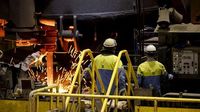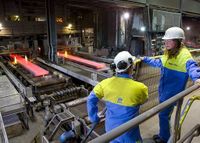Tata Steel Nederland is undergoing a significant reorganization that will result in the loss of 1,600 full-time jobs at its IJmuiden location, representing roughly one in five positions within the company. This restructuring is part of a larger transformation program aimed at streamlining operations and establishing a more sustainable future for the steel giant.
The announcement, made on April 9, 2025, indicates that the job cuts will primarily affect management and support services. In a press release, Tata Steel emphasized the need for a new organizational structure that is smaller and more centrally controlled, aiming to reduce bureaucracy and management layers. According to CEO Hans van den Berg, these changes are essential to enhance the company’s operational performance and financial stability.
The decision to cut jobs comes amid challenging times for the steel industry in Europe, which has been grappling with high energy prices and import restrictions imposed by the United States. In its latest financial report, Tata Steel reported a staggering loss of 556 million euros, further underscoring the urgent need for restructuring.
Union representatives from FNV and CNV have expressed outrage over the job losses, criticizing the lack of a clear plan and labeling the approach as socially unacceptable. FNV union leader Cihan Lacin described the announcement as a repeat of past mistakes, recalling a similar situation from a year prior when a reorganization plan was announced but ultimately reversed after employee pushback. Lacin stated, "Exactly a year ago, a reorganization was also announced without clear elaboration, which was eventually largely reversed. Now happens the same, without lessons being learned."
The unions have also pointed to the costly renovation of Blast Furnace 6 as an example of poor project management that has contributed to the current financial crisis. They argue that the management's failures should not result in job losses for the workforce. CNV leader Marten Jukema echoed these sentiments, stating, "This management has missed many opportunities to achieve better results, and now the staff has to pay the price."
Adding to the complexity of the situation, Tata Steel is currently negotiating with the Dutch government for financial support to advance its 'green steel' initiative. This ambitious plan aims to produce half of its steel using hydrogen instead of coal by 2030. However, union leaders argue that the transition to greener production will require more, not fewer, employees. Jukema remarked, "Everyone wants to make 'green steel' a success, but this does not align at all with cutting 1,600 jobs."
The timing of the reorganization has raised eyebrows, particularly since employees recently agreed to a crisis collective labor agreement, which included waiving structural wage increases to provide the company with financial breathing space. Union leaders have described the job cuts as a betrayal of trust, with CNV's Jukema stating, "Together with all employees, we accommodated Tata. And now the management does this. Unbelievable."
Both unions are demanding transparency regarding the financial justification for the layoffs and are preparing to mobilize their members for potential actions. FNV has called for a meeting on April 14 to discuss the next steps, while CNV is working on a counter-proposal to mitigate the number of redundancies.
In a broader context, the challenges faced by Tata Steel are not unique. The steel industry across Europe is struggling, as evidenced by the potential nationalization of British Steel due to financial difficulties. The company has reported losses of approximately 813,000 euros per day, exacerbated by U.S. tariffs on imported steel, which have further complicated the market landscape.
As the situation unfolds, the implications for Tata Steel and its workforce are profound. The company’s efforts to transition towards greener production could be jeopardized by the current cuts, raising questions about its long-term viability and commitment to sustainability. Dutch Minister of Economic Affairs Dirk Beljaarts expressed concern over the job cuts, stating, "We cannot afford to lose such signals in the current geopolitical climate. A strong manufacturing industry is essential for our economy."
In conclusion, Tata Steel Nederland’s announcement of significant job cuts as part of its reorganization raises critical questions about the future of the company and the steel industry as a whole. With unions poised to take action and the government involved in negotiations for support, the coming weeks will be crucial in determining the fate of both the employees and the company’s ambitious sustainability goals.








